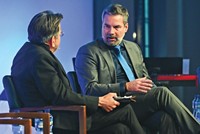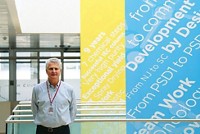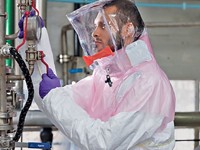Advertisement
Grab your lab coat. Let's get started
Welcome!
Welcome!
Create an account below to get 6 C&EN articles per month, receive newsletters and more - all free.
It seems this is your first time logging in online. Please enter the following information to continue.
As an ACS member you automatically get access to this site. All we need is few more details to create your reading experience.
Not you? Sign in with a different account.
Not you? Sign in with a different account.
ERROR 1
ERROR 1
ERROR 2
ERROR 2
ERROR 2
ERROR 2
ERROR 2
Password and Confirm password must match.
If you have an ACS member number, please enter it here so we can link this account to your membership. (optional)
ERROR 2
ACS values your privacy. By submitting your information, you are gaining access to C&EN and subscribing to our weekly newsletter. We use the information you provide to make your reading experience better, and we will never sell your data to third party members.
Outsourcing
EuroAPI is ready to emerge from Sanofi’s shadow
New company, already the world’s largest maker of small-molecule drugs, wants to get bigger as an independent firm
by Alex Scott
April 16, 2022
| A version of this story appeared in
Volume 100, Issue 13

With sales last year of more than $1 billion from active pharmaceutical ingredients (APIs) and contract services, EuroAPI is already big in the drug manufacturing world, and it reckons it is on the cusp of something bigger. Its owner, the French drug giant Sanofi, will spin it off on the stock market next month. When freed from a domineering corporate parent, EuroAPI says, it is going to grow.
EuroAPI at a glance
▸ Headquarters: Paris
▸ Sales in 2021: About $1 billion
▸ Pretax profits in 2021: $127 million
▸ Business: Production of active pharmaceutical ingredients, with a focus on complex chemistries, and contract development and manufacturing services
▸ Product portfolio: More than 200 active pharmaceutical ingredients
▸ Plants: Haverhill, England; Elbeuf and Vertolaye, France; Frankfurt, Germany; Budapest, Hungary; and Brindisi, Italy
▸ Customers: More than 500 from 80 countries
▸ Employees: 3,350
Source: Company.
While EuroAPI is bullish about its prospects for growth, not everyone is convinced. It will need a culture change away from that of a conservative Big Pharma company to one of agility and responsiveness to customer needs, industry watchers say. Additionally, EuroAPI’s profit margin is low compared with that of its peers, and improving it will take time.
Until a couple of years ago, Sanofi’s API business was primarily focused on filling spare capacity at its six disparate European manufacturing sites. Then Sanofi organized the six plants under the EuroAPI name with the aim of growing the assets into a more profitable business.
The drug company carved out the plants into a new organization in late 2020 and in January 2021 brought in Karl Rotthier as CEO. An industry veteran who was previously CEO of DSM Sinochem Pharmaceuticals, an anti-infectives business, Rotthier proceeded to build a team to run EuroAPI as an independent entity.
EuroAPI may be new, but it is already substantial. It claims to be the world’s largest small-molecule API manufacturer and the seventh-largest contract development and manufacturing organization (CDMO). Its production of multicustomer APIs brought in about $770 million in 2021, and its bespoke CDMO services generated about $260 million.
“We have indeed the number 1 position in the small-molecule API-CDMO world,” Rotthier said at an event showcasing the company to stock analysts earlier this month. “We have more than 200 active pharma ingredients in our portfolio. And we have the widest variety of technology in CDMO terms that I have seen up until now.”
EuroAPI’s origins are as the in-house drug manufacturing arm of Sanofi, and around half the firm’s sales are to the drug company. Even though selling APIs was a bit of a sideline for Sanofi, the firm successfully filled its plants with many products for other drug firms. As a result, EuroAPI will start life as an independent company with both a 5-year contract to supply Sanofi and 530 other customers.
Day 1 will be May 6, when 58% of the company is listed on the Euronext Paris stock exchange. French Tech Souveraineté, an investment fund set up by the French government, has agreed to purchase 12% of EuroAPI from Sanofi, leaving Sanofi with a 30% stake.
Not having independence has been holding EuroAPI back, Rotthier told stock analysts. “If we are not independent, if we do not have our own board . . . we cannot reach out to the customers who are currently the competitors of Sanofi.” Independence will give drug and biotech companies the confidence “to open up their kitchen secrets,” Rotthier said.
Rotthier said he spent EuroAPI’s first full year, in 2021, establishing the building blocks for success. “The company itself lacked a little bit of strategy, lacked a little bit of vision going forward,” he told C&EN in November during a tour of the firm’s plant in Haverhill, England. The company’s strategy is now clear; it is offering CDMO services and API production involving complex chemistry.
The firm dismisses the notion that it is a garden-variety manufacturer of APIs for generic drugs. Most of its APIs are highly differentiated, niche, complex molecules, Rotthier told investors.
EuroAPI uses complex chemistry to make steroids, alkaloids, sartans, antihistamines, and antipyretics. The firm uses fermentation technology to make vitamin B12 and anti-infectives. Additionally, at its Budapest, Hungary, site, EuroAPI produces highly potent prostaglandins from a process featuring more than 60 steps. “I would hardly call that a commodity,” Rotthier said.
Although making complex APIs is EuroAPI’s main business today, it aims to grow fastest in the custom development of new drugs for individual customers. The firm’s goals are to increase API sales by a single-digit percentage and its CDMO business by a double-digit percentage each year. It wants to become the number 5 CDMO by 2025.
“We are much more than just an API supplier,” Rotthier said. “We need to reach out to the entire generic world . . . but also to the innovator world with our CDMO activities. That business model was not pursued inside Sanofi.”
Of its 3,350 employees, about 300 are working on 30–50 process development projects at any given time, the company says. EuroAPI is targeting companies of all sizes as new CDMO customers. Biotechs and start-ups such as those around Cambridge, England, and Frankfurt, Germany, are of special interest because they do not often invest in their own production capacity, Rotthier said. “That’s a booming market,” he told C&EN in November.
While the company is big, its overall profit margin of 12.3% in 2021 is a long way behind those of its peers such as Siegfried, which has a profit margin forecast for 2022 of around 21%. EuroAPI is even further behind Bachem and Lonza, each of which is forecasting a profit margin this year of about 32%, according to a EuroAPI presentation. EuroAPI’s goal is to increase its margin to above 20% by 2025.
The success that EuroAPI is hoping for will depend, in part, on its ability to instill a customer-centric culture, says Roger LaForce, a veteran of the drug contracting industry and head of the Swiss consulting firm LaForce Business Solutions.
“Most of the management team members seem to have made their career in large organizations. It depends whether they will be able to change the mindset to a very flexible organization and management,” LaForce says. And while there is still room for more CDMOs in Europe, he adds, “most successful CDMOs have been in the field for decades.”
Still, LaForce sees positives in the EuroAPI business. “They have some good differentiation points, like opiates and fermentation. I can imagine that they will be successful in some areas where they are specialists, and less in others where they need to compete with the rest of the CDMO crowd,” he says.
Jan Ramakers, another industry analyst, sees some near-term challenges for EuroAPI. “As an example, it could be a few years down the line before EuroAPI has an opportunity to extend its activities into a new field—that of final drug formulation—because such activity risks EuroAPI competing with its largest customer, Sanofi,” Ramakers says. Firms like Siegfried and Lonza have been moving into drug formulation for years now.
“Overall, though, they have a great set of assets, and they know how to make APIs,” Ramakers says.
The need for a cultural shift is something that Rotthier and his management team acknowledged several times at the investor event. “My priority is instilling a CDMO mindset,” said Cécile Maupas, head of EuroAPI’s CDMO business.
While EuroAPI aims to create most of its growth by becoming a more attractive partner, the company expects to be helped over the next few years by an uptick in demand for CDMO services in Europe, according to Rotthier. “A lot of customers don’t dual source anymore from Asia but also are looking out more for European or Western producers,” he said.
This is happening because the pharmaceutical industry’s priority has shifted from cost to quality, reliability, and security of supply, Rotthier said. The high regulatory standards that EuroAPI has inherited from Sanofi are extremely important in this market. “This is really resonating now,” he said.
All six of EuroAPI’s plants are in Europe. “These are big assets also giving us the advantage of cost competitiveness via scale,” Rotthier said. The firm’s Haverhill plant is close to the Cambridge biotech hub, he noted, and its plant in Frankfurt is near a big German life sciences hub.
Investment in the plants is ongoing. EuroAPI plans capital spending of more than $545 million from 2022 to 2025. The money will go toward a number of projects already planned, including capacity expansion for peptides and oligonucleotides in Frankfurt, a new facility for highly active hormones in Vertolaye, France, and a capacity increase for prostaglandins in Budapest.
Looking further ahead, EuroAPI intends to get involved in biologic drugs—an area where it does not have a presence. But Rotthier wants to ensure that the small-molecule business is growing well and that its untapped potential is realized before he considers a move into biologics, such as via an acquisition. “We as a company need to deliver what we promise first,” he said.





Join the conversation
Contact the reporter
Submit a Letter to the Editor for publication
Engage with us on Twitter